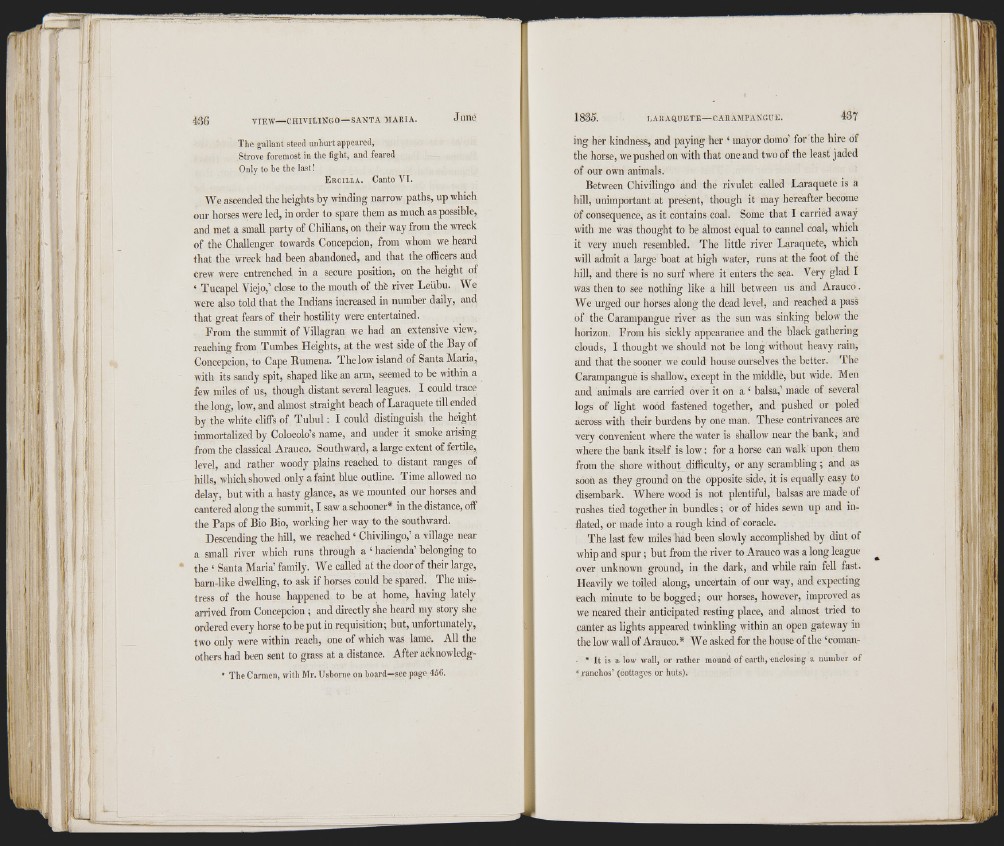
I
7 :'; 0I
I Ml
=
1 / i ti
- I! ‘
i i
? !0
r Í
4 3 () VIEW-----CI I IVILINOO — SANTA MARIA. JullO
The gallant steed unhurt appeared,
Strove foremost in the fight, and feared
Only to he the last!
E r c i l l a , Canto V I .
We ascended the heights by winding narrow paths, up which
our horses were led, in order to spare them as much as possible,
and met a small party of Chilians, on their way from the wreck
of the Challenger towards Concepcion, from whom we heard
that the wreck had been abandoned, and that the officers and
crew were entrenched in a secure position, on the height of
‘ Tucapel Viejo,’ close to the mouth of thè river Leübu. We
were also told that the Indians increased in number daily, and
that great fears of their hostility were entertained.
From the summit of Villagran we had an extensive view,
reaching from Tumbes Heights, at the west side of the Bay of
Concepcion, to Cape Rumena. The low island of Santa Maria,
with its sandy spit, shaped like an arm, seemed to be within a
few miles of us, though distant several leagues. I could trace
the long, low, and almost straight beach of Laraquete till ended
hy the white cliffs of Tuhul : I could distinguish the height
immortalized by Colocolo’s name, and under it smoke arising
from the classical Arauco. Southward, a large extent of fertile,
level, and rather woody plains reached to distant ranges of
hills, which showed only a faint blue outline. Time allowed no
delay, but with a hasty glance, as we mounted our horses and
cantered along the summit, I saw a schooner* in the distance, off
the Paps of Bio Bio, working her way to the southward.
Descending the hill, we reached ‘ Chivilingo,’ a village near
a small river which runs through a ‘ hacienda’ belonging to
the ‘ Santa Maria’ family. We called at the door of their large,
barn-like dwelling, to ask if horses could he spared. The mistress
of the house happened to be at home, having lately
arrived from Concepcion ; and directly she heard my story she
ordered every horse to be put in requisition; but, unfortunately,
two only were within reach, one of which was lame. All the
others had heen sent to grass at a distance. After acknowledg-
' The Carmen, with Mr. Ushorne on hoard—see page 45fi.
1 8 3 5 . T.ARAaUETE— CARAMPANGUK. 4 37
ing her kindness, and paying her ‘ mayor domo’ for the hire of
the horse, we pushed on with that one and two of the least jaded
of our own animals.
Between Chivilingo and the rivulet called Laraquete is a
hill, unimportant at present, though it may hereafter become
of consequence, as it contains coal. Some that I carried away
with me was thought to be almost equal to cannel coal, which
it very much resembled. The little i-iver Laraquete, which
will admit a large boat at high water, runs at the foot of the
hill, and there is no surf where it enters the sea. Very glad I
was then to see nothing like a hill between us and Arauco.
We urged our horses along the dead level, and reached a pass
of the Carampangue river as the sun was sinking below the
horizon. From his sickly appearance and the black gathering
clouds, I thought we should not he long without heavy rain,
and that the sooner we could house ourselves the better. The
Carampangue is shallow, except in the middle, hut wide. Men
and animals are carried over it on a ‘ balsa,’ made of several
logs of light wood fastened together, and pushed or poled
across with their burdens by one man. These contrivances are
very convenient where the water is shallow near the bank, and
where the bank itself is low: for a horse can walk upon them
from the shore without difficulty, or any scrambling ; and as
soon as they ground on the opposite side, it is equally easy to
disembark. Where wood is not plentiful, balsas are made of
rushes tied together in bundles ; or of hides sewn up and inflated,
or made into a rough kind of coracle.
The last few miles had been slowly accomplished by dint of
whip and spur ; but from the river to Arauco was a long league
over unknown ground, in the dark, and while rain fell fast.
Heavily we toiled along, uncertain of our way, and expecting
each minute to be bogged; our horses, however, improved as
we neared their anticipated resting place, and almost tried to
canter as lights appeared twinkling within an open gateway in
the low wall of Arauco.* We asked for the house of the ‘coman-
• it is a low wall, or rather mound of earth, «nelosing a number of
* ranchos’ (cottages or huts).
!t.
li.'
f;}
I'i